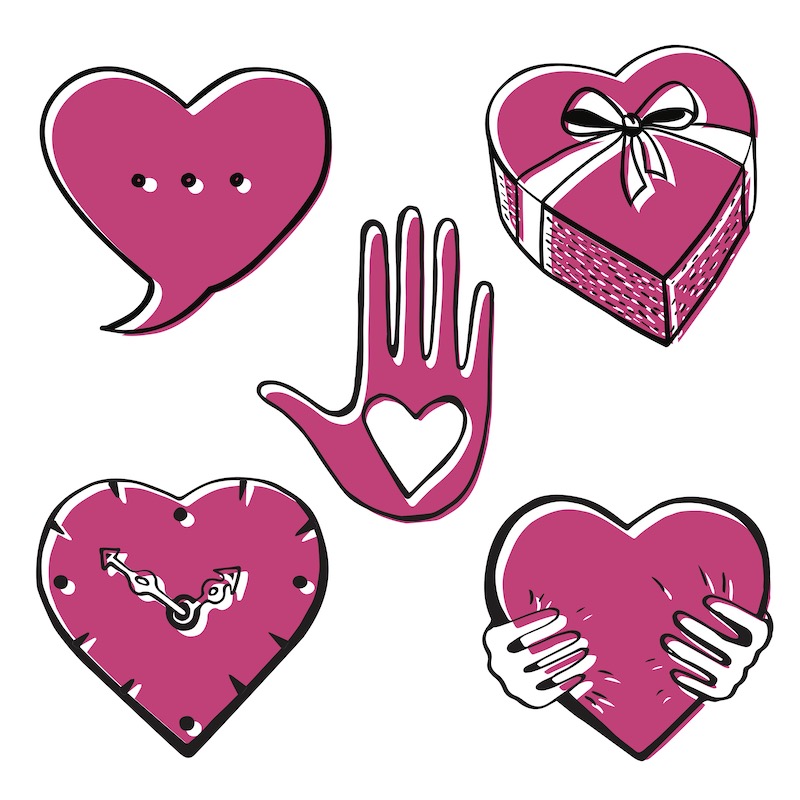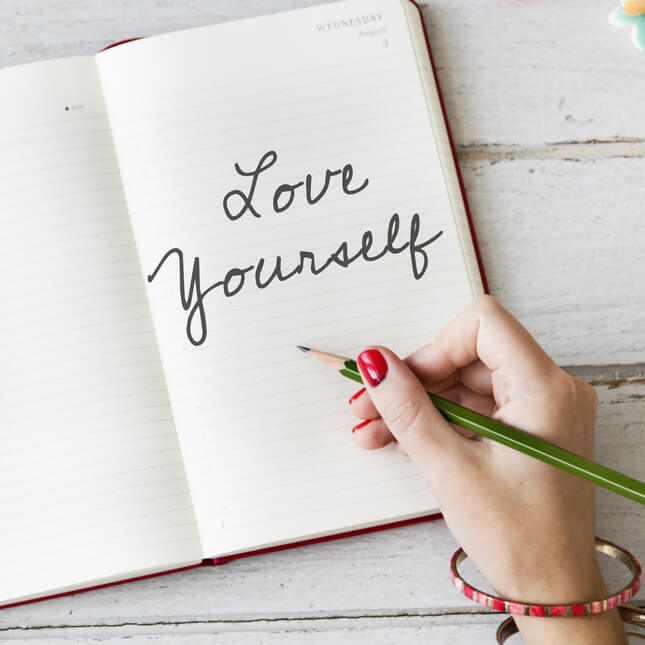5 Minute Read
Words by Kate Lucey
Share this article…

Becoming aware of how you and those close to you “speak love” can suddenly help a lot of things make sense.
There’s a theory gaining traction that we all communicate via five distinct Love Languages, which represent how we individually define giving and receiving love. The concept was coined in Gary Chapman’s book The 5 Love Languages: The Secret to Love That Lasts, which was actually published in 1992, but is gaining a whole new lease of life thanks to TikTok.
So what are the five Love Languages, and what do they mean?
Think about which of these makes you feel the most loved and cared for.
1. Acts of Service
Someone going out of their way to do you a favour. This could be driving you to an airport or waiting up late/getting up early. Bringing you a tea in bed, reading a work report before you hand it in, or anything that they absolutely don’t have to do but choose to, because they know it’s important to you.
2. Receiving Gifts
This one’s pretty self explanatory, but doesn’t have to be grand gestures. A gift could be something as small as your favourite tea from a shop someone was passing, or a fancy beer mat from a bar to add to your collection. Gifting you with something that will delight you because you want it, not necessarily because you need it. A bar of Galaxy while you watch your favourite film?

3. Physical Intimacy
Steady on, this doesn’t just mean non-stop sex. Physical intimacy shows itself in an affectionate rub on the arm and kiss on the forehead, to holding hands, hugging, and yes, doing the horizontal tango. Someone who needs physical intimacy to feel love will feel rejected if a partner doesn’t like to hold hands or kiss in public.
4. Words of Affirmation
Written or spoken words from someone you love, telling you how much they love or appreciate you. Despite the airports you’ve been driven to or the flowers you’ve received and baths you’ve been run, this person still needs to actually hear someone say “I love you” or “you look beautiful” – even if they shower you with kisses as soon as they lay eyes upon you.
5. Quality Time
No phones, no other friends or children, just the two of you having uninterrupted time together to talk and share. If you truly feel loved when you have your partner’s undivided attention, this one’s for you.
Is it possible to have more than one love language?
Yes. While it’s likely we’ll have one dominant love language, the other four are still important and act as other ways of expressing love. Just because someone enjoys a hug doesn’t mean they’ll turn their nose up at a gift, for example, but they may feel conflicted when they receive one as really they’d rather a big hug and a snog.
How can knowing your love languages change your relationship?
What makes one person feel loved and appreciated won’t necessarily work for their other half. Personally, my main love language is physical intimacy and I’m a very “huggy” person. I love holding hands, hugging and giving affectionate arm or leg rubs in public. If a partner’s not into this and thinks I’m an over-affectionate obsessive, l feel rejected. Meanwhile, they may appreciate it more if I showed my love in entirely different ways.
Knowing your partner’s love language can help you recognise when they’re showing you how much they love you.
Psychotherapist and Counselling Directory member, Beverley Blackman, tells WYLDE MOON: “With many people, there seems to be an assumption that, if they are in love, they should just know how to make their partner feel loved. But this isn’t the case. Communication is the cornerstone of every relationship, and if a little help can be offered by identifying both your own and your partner’s love languages, then so much the better. It means you understand both yourself and your partner better, and paves the way to better communication and hence a stronger relationship.”
Knowing your partner’s love language can help you recognise when they’re showing you how much they love you, even if it’s in ways you don’t recognise in yourself. Life would be very boring if we were all the same, hey?
How to make sure you’re speaking your partner’s love language?
“You never tell me you love me!” is often met with a “but I bring you flowers every Friday and we have three date nights a week” – esque response. If someone else’s Love Language doesn’t come naturally to us, how can we show them they’re loved and how can we feel adored in return?
You could start by showing this article to your partner, explaining what you’ve read about love languages and that you’re curious to know if there’s anything from those five areas that would make them feel more loved by you. It is an opportunity to explain to them what you need too.
Beverley continues, “It doesn’t matter if you and your partner have different love languages. It can be a good talking and bonding point to do the test together and see where your tendencies lie, and then to discuss them. If both you and your partner are aware of each other’s love languages, then it becomes something you can both make an effort with.”

What if we need our partner to do more towards our own love language?
“If your love language is touch but your partner brings you a gift (or vice-versa), then you may have mixed feelings,” says Beverely. “It’s a kind gesture but when you need a hug, a gift, however well-chosen or symbolic, may not be quite enough. Let your partner know that you need a hug or to be held, or anything that involves touch. If they are aware of your love language, then they will probably happily oblige.
“If your love language is acts of service ask your partner if they would mind helping you with something; perhaps, while they are helping you, you can remind them of your love language and thank them for helping. If they are aware that it’s your love language, then they may well grab the opportunity to support you and make you feel seen and loved. Different love languages all benefit from communication, gentle reminders, a bit of teasing, perhaps – but they will gradually become second nature to you and your partner.”

Use this to show some self-love
You don’t need a romantic or platonic partner to feel loved. Showing yourself some love is increasingly more important as we continue to live stressful lives and burn out. If you’re happily single, it’s just as important knowing what your predominant love languages are.
Beverley has some recommendations:
“If your love language is quality time, then consider who best to spend it with,” she advises.
“If it’s touch, and regular massages are too expensive, consider giving yourself a hand massage – it’s astonishing how much tension we carry in our very busy hands. Touch can also encompass what you touch, so stroking a pet, or body brushing, or wearing something tactile like a soft scarf, can all help meet your needs.”
“Gifts can be used as rewards – perhaps there’s something to treat yourself to once you’ve met one of your goals? ‘To-me-from-me-with-love’ can be a very powerful way of validating yourself and celebrating achievements or successes.
“Acts of service can be a little more difficult. If you’re ordering a drink or a coffee, be in the moment when it’s handed to you, smile and acknowledge the other person. Or perhaps a friend does you a favour, in which case be mindful of the gratitude you feel, and allow yourself to feel loved through gestures of support from others, however big or small they may be.
“Really revel in the moments when you receive words of affirmation, and enjoy the sense that the other person appreciates you.”
A lot of feeling better about ourselves is from knowing what we like and need to feel whole and loved. Defining your predominant love languages and communicating them to your loved ones is a great place to start.
Share this article…





